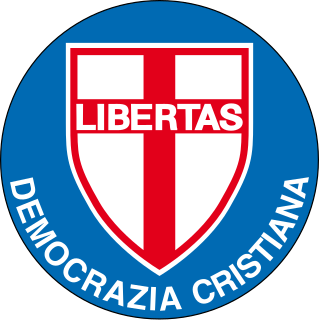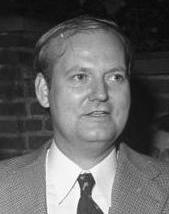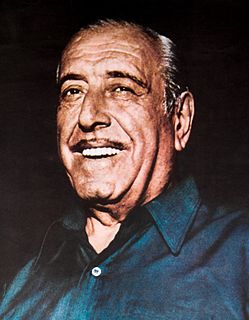
Christian Democracy was a Christian democratic political party in Italy. The DC was founded in 1943 as the ideal successor of the Italian People's Party, which had the same symbol, a crusader shield. A Catholic-inspired, centrist, catch-all party comprising both centre-right and centre-left political factions, the DC played a dominant role in the politics of Italy for fifty years, from its inception in 1944 until its final demise in 1994 amid the Tangentopoli scandals and Christian Democrats led the government continuously until 1981. The party was nicknamed the "White Whale" due to party's huge organization and to its official color. During its time in government, the Italian Communist Party was the largest opposition party.

Les Engagés is a progressive and centrist French-speaking political party in Belgium. The party originated in the split in 1972 of the unitary Christian Social Party (PSC-CVP) which had been the country's governing party for much of the post-war period. It continued to be called the Christian Social Party until 2002 when it was renamed the Humanist Democratic Centre. It took its current name on 17 March 2022, and currently does not participate in any government.

The Union for French Democracy was a centre to centre-right political party in France. It was founded in 1978 as an electoral alliance to support President Valéry Giscard d'Estaing in order to counterbalance the Gaullist preponderance over the political right in France. This name was chosen due to the title of Giscard d'Estaing's 1976 book, Démocratie française. The party brought together Christian democrats, liberals and radicals, and non-Gaullist conservatives, and described itself as centrist.
Christian democracy is a political ideology that emerged in 19th-century Europe under the influence of Catholic social teaching, as well as neo-Calvinism. It was conceived as a combination of modern democratic ideas and traditional Christian values, incorporating social justice as well as the social teachings espoused by the Catholic, Lutheran, Reformed, Pentecostal and other denominational traditions of Christianity in various parts of the world. After World War II, Catholic and Protestant movements of neo-scholasticism and the Social Gospel, respectively, played a role in shaping Christian democracy.

The National Intelligence Centre is the Spanish official intelligence agency, acting as both its foreign and domestic intelligence agency. Its headquarters are located next to the A-6 motorway near Madrid. The CNI is the successor of the Centro Superior de Información de la Defensa, the Higher Centre for Defence Intelligence. Its main target areas are North Africa and South America and it operates in more than 80 countries. CNI's official budget for 2021 is approximately 300 million euros.

The Catholic People's Party was a Catholic Christian democratic political party in the Netherlands. The party was founded in 1945 as a continuation of the Roman Catholic State Party, which was a continuation of the General League of Roman Catholic Caucuses. During its entire existence, the party was in government. In 1977, a federation of parties including the Catholic People's Party, the Anti-Revolutionary Party (ARP) and the Christian Historical Union (CHU) ran together under the Christian Democratic Appeal (CDA) banner. The three participating parties formally dissolved to form the CDA in 1980.

Bo Göran Hägglund is a Swedish politician of the Christian Democrats. He was Leader of the Christian Democrats from 2004 to 2015, Member of the Riksdag from 1991 to 2015, and served as Minister for Social Affairs from 2006 to 2014.
The Christian Democratic Union , formerly known as Popular Democracy was a Christian democratic political party in Ecuador. It was formed in the 1970s by centrist Christian Democrats who had left the Social Christian Party and the left wing of the Conservative Party who were oriented towards Liberation theology. It officially registered as a political party in 1979. It was originally considered a centre-left party. Later in the 1990s, it shifted to the centre-right.

The Union of the Democratic Centre was an electoral alliance, and later political party, in Spain, existing from 1977 to 1983. It was initially led by Adolfo Suárez.

The Christian Democratic Party is a Christian-democratic political party in Bolivia.

The First Van Agt cabinet, also called the Van Agt–Wiegel cabinet was the executive branch of the Dutch Government from 19 December 1977 until 11 September 1981. The cabinet was formed by the christian-democratic Christian Democratic Appeal (CDA) and the conservative-liberal People's Party for Freedom and Democracy (VVD) after the election of 1977. The cabinet was a centre-right coalition and had a slim majority in the House of Representatives with Christian Democratic Leader Dries van Agt serving as Prime Minister. Liberal Leader Hans Wiegel served as Deputy Prime Minister and Minister of the Interior.
The Centre of Social Democrats was a Christian-democratic and centrist political party in France. It existed from 1976 to 1995 and was based directly and indirectly on the tradition of the Popular Republican Movement (MRP). The CDS was one of the co-founding parties of the European People's Party, and later merged into the Democratic Force.

The Italian Democratic Socialist Party, also known as Italian Social Democratic Party, was a minor social-democratic political party in Italy. The longest serving partner in government for Christian Democracy, the PSDI had been an important force in Italian politics, before the 1990s decline in votes and members. The party's founder and longstanding leader was Giuseppe Saragat, who served as President of the Italian Republic from 1964 to 1971.

Dietrich Stobbe was a German politician who served as the Mayor of West Berlin from 1977 to 1981, as a member of the Social Democratic Party (SPD). Stobbe also served as President of the Bundesrat from 1 November 1978 to 31 October 1979.
Social–liberal coalition in the politics of Germany refers to a governmental coalition formed by the Social Democratic Party of Germany (SPD) and the Free Democratic Party (FDP).

The Socialist Party of the Valencian Country is a social-democratic political party in the Valencian Community, and is a regional branch of the national Spanish Socialist Workers' Party (PSOE).

The first Argentine general election of 1973 was held on 11 March. Voters chose both the President and their legislators.

Roelof Johannes Hendrik Kruisinga was a Dutch politician of the defunct Christian Historical Union (CHU) party and later the Christian Democratic Appeal (CDA) party and physician.

General elections were held in El Salvador between 26 and 29 March 1950. The result was a victory for Óscar Osorio in the presidential election, and his Revolutionary Party of Democratic Unification in the legislative election.